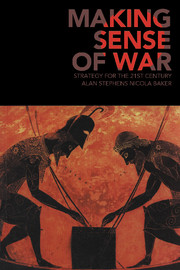Book contents
- Frontmatter
- Contents
- Abbreviations
- Preface
- Introduction
- Chapter 1 How to win
- Chapter 2 Stove-piped strategy
- Chapter 3 Traditional warfighting concepts and practices
- Chapter 4 Manoeuvre and the application of force
- Chapter 5 Shaping the strategic environment
- Chapter 6 Strategic paralysis
- Chapter 7 Contemplating war
- Chapter 8 Constraints on war
- Chapter 9 Controlling war
- Chapter 10 Peacemaking
- Chapter 11 War in the twenty-first century
- Notes
- Select bibliography
- Index
Chapter 9 - Controlling war
Soldiers, civilians, and the optimum use of force
Published online by Cambridge University Press: 05 June 2012
- Frontmatter
- Contents
- Abbreviations
- Preface
- Introduction
- Chapter 1 How to win
- Chapter 2 Stove-piped strategy
- Chapter 3 Traditional warfighting concepts and practices
- Chapter 4 Manoeuvre and the application of force
- Chapter 5 Shaping the strategic environment
- Chapter 6 Strategic paralysis
- Chapter 7 Contemplating war
- Chapter 8 Constraints on war
- Chapter 9 Controlling war
- Chapter 10 Peacemaking
- Chapter 11 War in the twenty-first century
- Notes
- Select bibliography
- Index
Summary
THE CHALLENGES POSED BY what General Rupert Smith calls ‘wars among the people’ have been recognised by military leaders since the Vietnam War, but the lessons drawn and responses made have often been skewed by institutional defensiveness and traditional preferences. The wrong turn made by the US military, which has been the most actively engaged in inter-state war since 1945 and which has insisted on leadership in the multinational operations in which it has been involved since the end of the Cold War, has in turn further undermined the United States' own ability and the ability of the coalitions it leads to achieve the objectives set for them.
The political authorities who are the ultimate decision-makers in matters of war and determine these objectives, generally agreed with military priorities during the Cold War when both parties were most concerned with the potential for inter-bloc conventional war in Europe. They too had an interest in avoiding a repetition of Vietnam and allowed their armed forces to concentrate on what they saw as their core business: conventional warfighting. But the end of the Cold War and the rash of civil wars that spread over the new strategic landscape altered perceptions of national interest and forced a re-examination of military priorities. This re-examination resurrected an old debate about the proper relationship between civilian and military leaders and opened a new one about the proper relationship between states cooperating to use force in the changed international environment.
- Type
- Chapter
- Information
- Making Sense of WarStrategy for the 21st Century, pp. 217 - 236Publisher: Cambridge University PressPrint publication year: 2006



